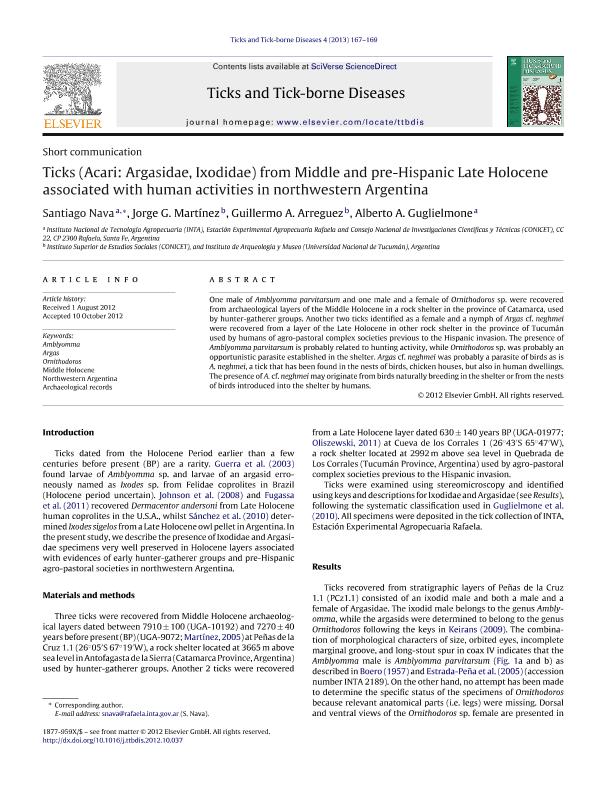Mostrar el registro sencillo del ítem
dc.contributor.author
Nava, Santiago

dc.contributor.author
Martinez, Jorge Gabriel

dc.contributor.author
Arreguez, Guillermo Anibal

dc.contributor.author
Guglielmone, Alberto Alejandro

dc.date.available
2017-04-26T19:06:06Z
dc.date.issued
2013-04
dc.identifier.citation
Nava, Santiago; Martinez, Jorge Gabriel; Arreguez, Guillermo Anibal; Guglielmone, Alberto Alejandro; Ticks (Acari: Argasidae, Ixodidae) from Middle and pre-hispanic Late Holocene associated with human activities in Northwestern Argentina; Elsevier; Ticks and Tick-borne Diseases; 4; 1-2; 4-2013; 167-169
dc.identifier.issn
1877-959X
dc.identifier.uri
http://hdl.handle.net/11336/15754
dc.description.abstract
One male of Amblyomma parvitarsum and one male and a female of Ornithodoros sp. were recovered from archaeological layers of the Middle Holocene in a rock shelter in the province of Catamarca, used by hunter-gatherer groups. Another two ticks identified as a female and a nymph of Argas cf. neghmei were recovered from a layer of the Late Holocene in other rock shelter in the province of Tucumán used by humans of agro-pastoral complex societies previous to the Hispanic invasion. The presence of Amblyomma parvitarsum is probably related to hunting activity, while Ornithodoros sp. was probably an opportunistic parasite established in the shelter. Argas cf. neghmei was probably a parasite of birds as is A. neghmei, a tick that has been found in the nests of birds, chicken houses, but also in human dwellings. The presence of A. cf. neghmei may originate from birds naturally breeding in the shelter or from the nests of birds introduced into the shelter by humans.
dc.format
application/pdf
dc.language.iso
eng
dc.publisher
Elsevier

dc.rights
info:eu-repo/semantics/openAccess
dc.rights.uri
https://creativecommons.org/licenses/by-nc-nd/2.5/ar/
dc.subject
Ticks
dc.subject
Middle Holocene
dc.subject
Northwestern Argentina
dc.subject
Archeological Records
dc.subject
Amblyomma
dc.subject
Argas
dc.subject
Ornithodoros
dc.subject.classification
Ciencias Veterinarias

dc.subject.classification
Ciencias Veterinarias

dc.subject.classification
CIENCIAS AGRÍCOLAS

dc.title
Ticks (Acari: Argasidae, Ixodidae) from Middle and pre-hispanic Late Holocene associated with human activities in Northwestern Argentina
dc.type
info:eu-repo/semantics/article
dc.type
info:ar-repo/semantics/artículo
dc.type
info:eu-repo/semantics/publishedVersion
dc.date.updated
2017-04-18T13:44:41Z
dc.journal.volume
4
dc.journal.number
1-2
dc.journal.pagination
167-169
dc.journal.pais
Alemania

dc.journal.ciudad
Berlín
dc.description.fil
Fil: Nava, Santiago. Instituto Nacional de Tecnología Agropecuaria. Centro Regional Santa Fe. Estación Experimental Agropecuaria Rafaela; Argentina. Consejo Nacional de Investigaciones Científicas y Técnicas. Centro Científico Tecnológico Conicet - Santa Fe; Argentina
dc.description.fil
Fil: Martinez, Jorge Gabriel. Consejo Nacional de Investigaciones Científicas y Técnicas. Centro Científico Tecnológico Conicet - Tucuman. Instituto Superior de Estudios Sociales. Universidad Nacional de Tucuman. Instituto Superior de Estudios Sociales; Argentina
dc.description.fil
Fil: Arreguez, Guillermo Anibal. Consejo Nacional de Investigaciones Científicas y Técnicas. Centro Científico Tecnológico Conicet - Tucuman. Instituto Superior de Estudios Sociales. Universidad Nacional de Tucuman. Instituto Superior de Estudios Sociales; Argentina
dc.description.fil
Fil: Guglielmone, Alberto Alejandro. Instituto Nacional de Tecnología Agropecuaria. Centro Regional Santa Fe. Estación Experimental Agropecuaria Rafaela; Argentina. Consejo Nacional de Investigaciones Científicas y Técnicas. Centro Científico Tecnológico Conicet - Santa Fe; Argentina
dc.journal.title
Ticks and Tick-borne Diseases
dc.relation.alternativeid
info:eu-repo/semantics/altIdentifier/doi/http://dx.doi.org/10.1016/j.ttbdis.2012.10.037
dc.relation.alternativeid
info:eu-repo/semantics/altIdentifier/url/http://www.sciencedirect.com/science/article/pii/S1877959X12001227
Archivos asociados
